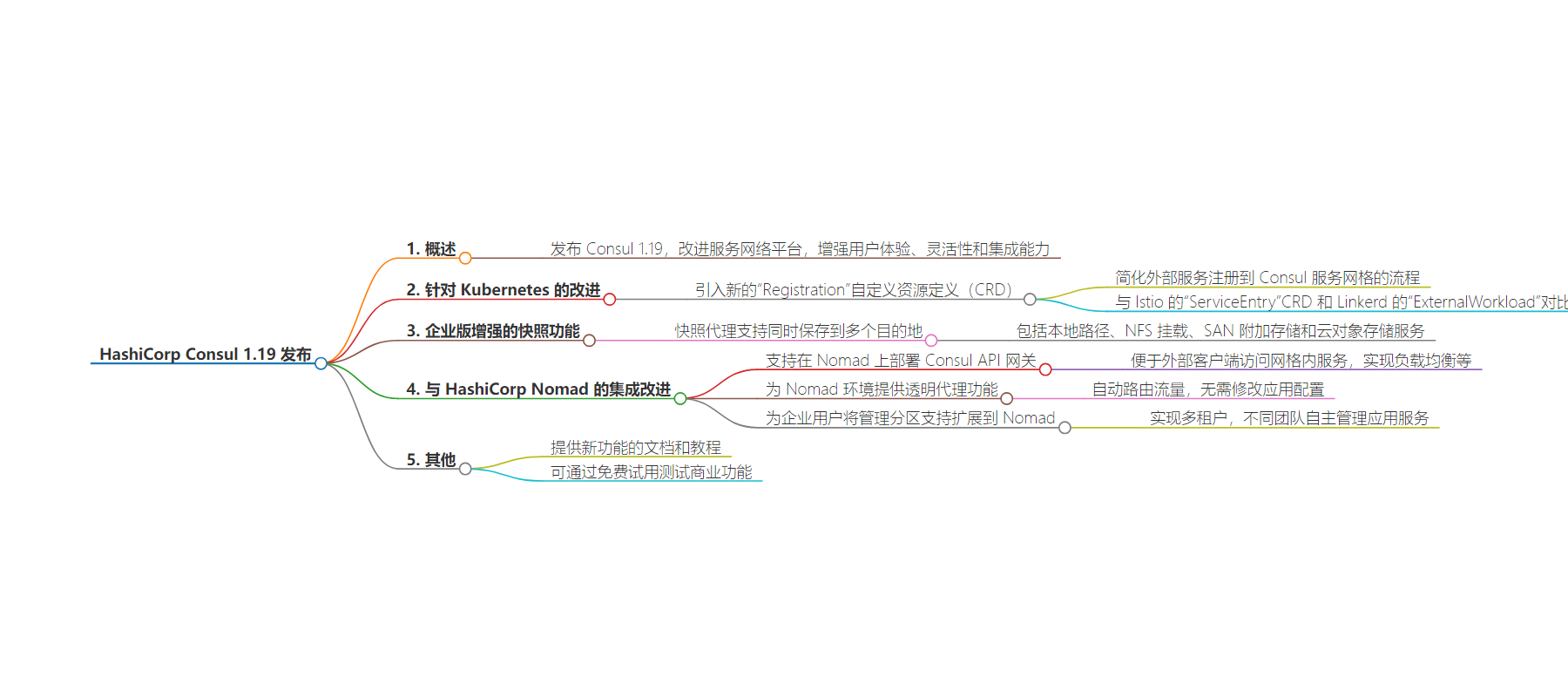包阅导读总结
1.
关键词:HashiCorp、Consul 1.19、Kubernetes、Nomad、Integration
2.
总结:HashiCorp 发布 Consul 1.19,对服务网络平台进行多项改进,包括增强与 Kubernetes 和 Nomad 的集成,简化服务注册流程,提升快照能力等,为用户带来更好体验和更多功能。
3.
主要内容:
– Consul 1.19 发布,改进服务网络平台
– 引入新的“Registration”CRD 简化 Kubernetes 外部服务注册
– 对比 Istio 和 Linkerd 类似功能有优势
– 增强 Consul Enterprise 快照能力,支持多目的地存储
– 显著改善与 HashiCorp Nomad 的集成
– 支持 Consul API 网关在 Nomad 上部署
– 为 Nomad 环境提供透明代理功能
– 对 Nomad 扩展管理分区支持,实现多租户
思维导图:
文章来源:infoq.com
作者:Matt Saunders
发布时间:2024/7/23 0:00
语言:英文
总字数:391字
预计阅读时间:2分钟
评分:82分
标签:服务网格,Consul,Kubernetes,Nomad,HashiCorp
以下为原文内容
本内容来源于用户推荐转载,旨在分享知识与观点,如有侵权请联系删除 联系邮箱 media@ilingban.com
HashiCorp has announced the general availability of Consul 1.19, introducing several improvements to its service networking platform. The latest version focuses on enhancing user experience, providing greater flexibility, and strengthening integration capabilities.
One of the key updates in Consul 1.19 is the introduction of a new “Registration” custom resource definition (CRD) for Kubernetes. This feature simplifies registering external services into the Consul service mesh. Previously, operators had to follow a three-step process involving Consul’s catalogue APIs, access control list (ACL) policy assignment, and termination gateway configuration. The new Registration CRD streamlines this workflow, offering a Kubernetes-native method for service registration and automatic updating of terminating gateway ACLs.
This new CRD compares favourably with similar functionality in products such as Istio, which has a “ServiceEntry” CRD, and Linkerd which has “ExternalWorkload” for access to external services.
Consul Enterprise users will also benefit from enhanced snapshot capabilities in version 1.19. The snapshot agent now supports saving Consul snapshots to multiple destinations simultaneously. This improvement allows organizations to implement robust backup strategies, potentially improving recovery time objectives. Supported storage options include local paths, NFS mounts, SAN attached storage, and cloud object storage services like Amazon S3, Google Cloud Storage, and Microsoft Azure Blob storage.
Consul 1.19 also significantly improves its integration with HashiCorp Nomad, the company’s cluster orchestrator. The update introduces support for Consul API gateway deployment on Nomad, enabling external clients to access services within the mesh. This feature facilitates load balancing, HTTP header modification, and traffic splitting based on weighted ratios.
Additionally, Consul’s transparent proxy feature is now available for Nomad environments. This simplifies service mesh adoption by automatically routing traffic to upstream services without requiring developers to modify their application configurations.
For enterprise users, Consul 1.19 extends admin partition support to Nomad. This feature enables multi-tenancy, allowing different teams to manage their application services autonomously while sharing the same Consul and Nomad control planes. Admin partitions aim to reduce management overhead and improve cost efficiency at scale.
HashiCorp has made documentation available for the new features, including guides on using the Registration CRD and deploying Consul API gateway on Nomad. The company encourages users to explore these new capabilities through their tutorials for both beginners and advanced users. Interested users can test commercial features like the snapshot agent and admin partitions through free trials of HCP Consul or self-managed Consul Enterprise.
